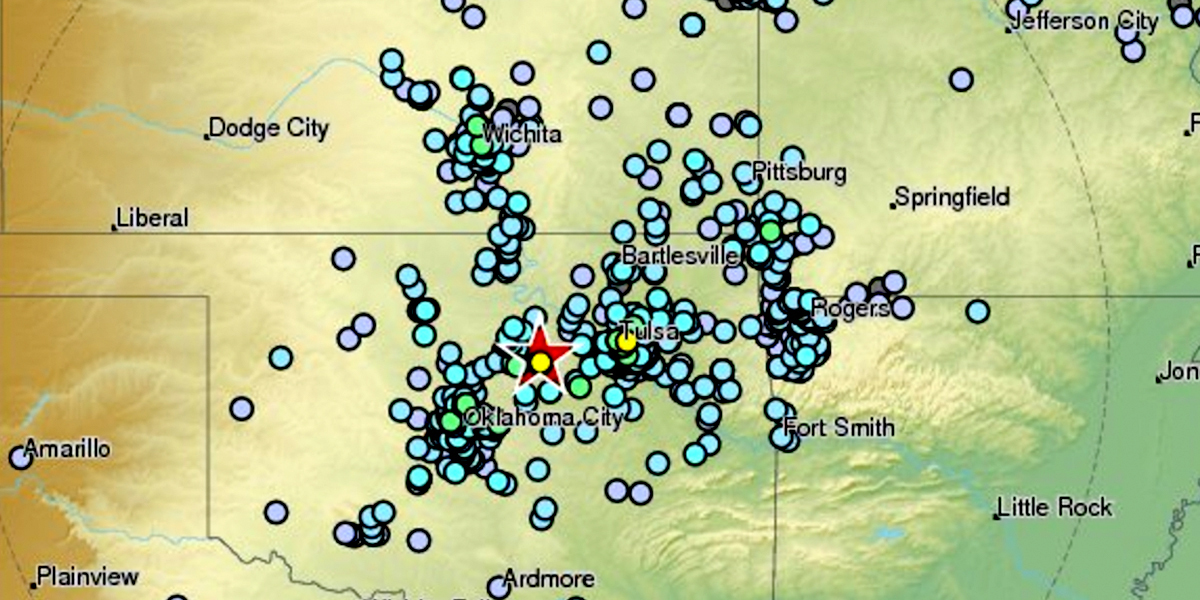

A magnitude 5.0 earthquake struck Oklahoma Sunday night, damaging buildings in the heart of the oil hub town of Cushing. Schools are closed and parts of the downtown area are cordoned off, as the latest in a string of 19 quakes were recorded in Oklahoma last week, an area where such events were virtually unknown prior to the fracking boom.
M5.3 #earthquake (#sismo) strikes 92 km NE of Oklahoma City (#Oklahoma) 28 min ago. Effects reported by witnesses: pic.twitter.com/TPdolNQL1a
— EMSC (@LastQuake) November 7, 2016
Bricks and concrete crashed down as windows shattered and residents were rattled at 7:44 p.m. local time. At least one senior living complex was evacuated. Cushing city officials have told people to stay out of the downtown area.
Bloomberg reported this morning that some gas leaks have occurred, but they have been contained. As a precaution, All companies that run intra-state pipelines that fall under the jurisdiction of the Oklahoma Corporation Commission have shut down operations.
The quake was felt as far as Illinois, Kansas, Missouri, Arkansas and Texas.
Oklahoma has become the world capital of earthquakes. In neighboring Kansas, injection of wastewater from fracking was determined as the cause of the state’s largest-ever earthquake in 2014. A study published in Science determined a link between wastewater injection and earthquakes in Texas. And earlier this year, a study confirmed a causal relationship not only between wastewater injection and fracking, but to the process of hydraulic fracturing itself.
#Oklahoma #Earthquake Officially Largest in State's History https://t.co/aW8LUxpdFf @MarkRuffalo @joshfoxfilm @FrackAction @foodandwater
— EcoWatch (@EcoWatch) September 6, 2016
Cushing, a town of 7,900 that calls itself the Pipeline Crossroads of the World, is home to one of the largest oil storage terminals on the planet, and reported 58.4 million barrels of oil in its tanks as of last month. As of this morning, no damage has been reported to either pipelines or the oil storage facility.
But damaged pipelines as a result of earthquakes have happened. In December 2013, an earthquake ruptured a gas pipeline in the Russian city of Sochi, site of the 2014 Winter Olympic games. The 1971 San Fernando earthquake in California damaged water, gas and sewage pipelines. Other earthquakes have caused failures in pipelines in China, Japan and the U.S.
In a paper by Teoman Ariman of the University of Tulsa, Oklahoma, he wrote, “The type of severity of pipeline damage in earthquakes are directly related to the patterns of ground movements which can be due to faulting, soil liquefaction, landslides and compaction.” Ariman also noted that “steel pipelines withstood ground shaking but were unable to resist the large permanent ground deformations generated by faulting and ground failures.”
As daylight broke, the full extent of the damage in Cushing was being evaluated.
https://twitter.com/petrolgasnews/statuses/795605668304748544
A 5.0-magnitude earthquake has struck near a major oil hub in Oklahoma https://t.co/a5PRLlLZ7D by #SkyNews via @c0nvey
— Anton steyn (@GoggaAnton) November 7, 2016
Earthquake hits #Oklahoma, could be felt in Iowa, Illinois and Texashttps://t.co/fpwdJGThaz
— 6 News (@WJACTV) November 7, 2016

 233k
233k  41k
41k  Subscribe
Subscribe 